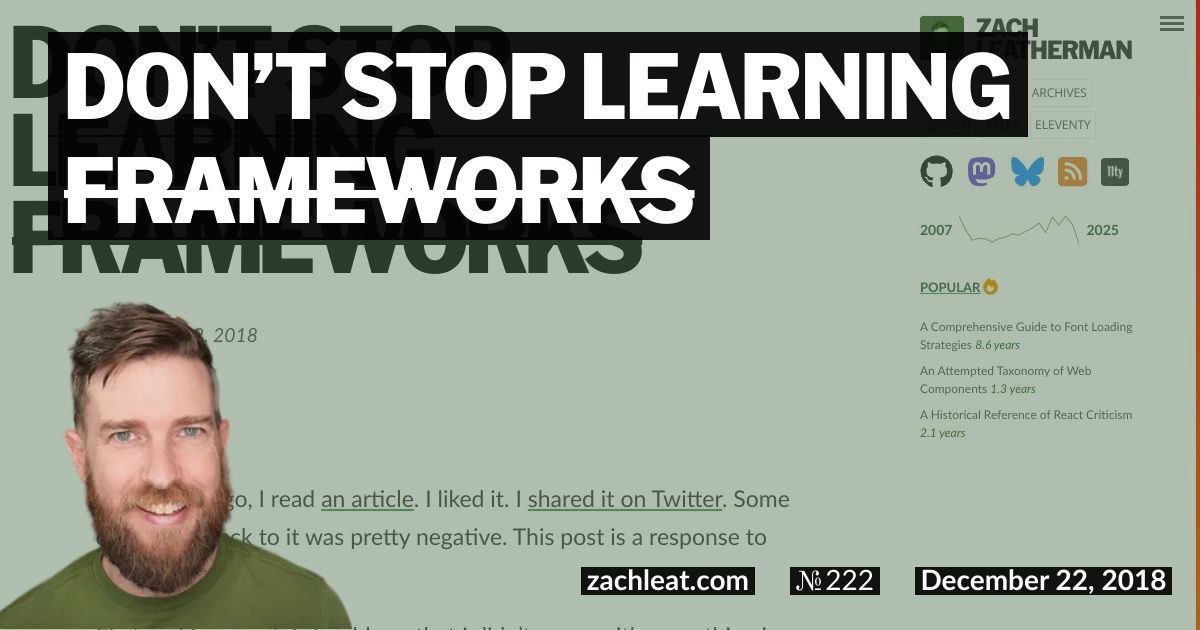Don’t Stop Learning Frameworks
A few days ago, I read an article. I liked it. I shared it on Twitter. Some of the feedback to it was pretty negative. This post is a response to that feedback.
First and foremost, I should say that I didn’t agree with everything in the blog post. If total agreement were a prerequisite to tweet, I would share zero things on Twitter (don’t get your hopes up 😇).
More fundamentals! Less frameworks!
Skills with long shelf lives (unordered):
* HTML
* CSS
* JavaScript
* Progressive Enhancement
* Accessibility
* Typography
* Usability
* Design
* Clean Code and writing Testable Code
Lots of gold here: https://sizovs.net/2018/12/17/stop-learning-frameworks/
via @nicknisi
December 17, 2018
Coming back to the article and re-reading a few days later, save for the headline it still reads as a fairly measured take. Don’t spend too much of your non-work time learning the framework du jour and spend time learning skills that will provide a good return on your investment and still be useful when the next thing comes along.
One of the most important pieces of professional web development is prioritizing what to learn and when. It’s kind of like buying stocks.
May 4, 2017
One caveat—I don’t think that learning a framework is a waste of time. Any act of creation is a learning opportunity, independent of your particular constraints.
- If you’re a beginner you don’t have insight into the nuances of library/framework/tool selection—maybe you’ll try out your hand at Vue. Why not? (Do it—Vue is good.)
- If you’re trying to find a job and the job listing requirements all say “React experience,” you’re going to want to learn React.
- If you already have a job and the senior developers/architects have decided that the official stack uses Angular, you’re going to want to learn Angular.
Learn fundamentals for a career! Learn frameworks for a job!
@cajunAA on December 18, 2018
My Own Experience
My own web development experience has in fact traveled through a fair number of such JavaScript-specific tools. Early on in my career I learned a ton from the Yahoo! User Interface libraries. But perhaps the most idyllic example of this came early on in my web development career at the advent of Web 2.0.
The year was 2006. Internet Explorer 7 was but a newborn baby and Internet Explorer 6 was the default browser on the mega-corp beige boxes adorning every matching beige box cubicle. I had just started at the company and was placed on a project that already had the software stack laid out (coupled with a very lengthy requirements document). Due to various corporate agreements, the company had purchased a suite of tools that included an “AJAX/Web 2.0” framework called TIBCO General Interface. I wrote a blog post about this tool ten years ago.
I pored over this thing—I learned it inside and out. Even though it was closed source and we only had access to obfuscated/minified JavaScript, I rewrote some of the internals to eek out some additional performance. I got in touch with the authors to contribute my changes back into the core package. I learned that XSLT could be quite speedy on Internet Explorer compared to direct DOM Node manipulation (appendChild et al). I learned a ton about debugging and performance profiling. Shout out to DynaTrace Ajax Edition, which had a really lovely performance profiler for old versions of Internet Explorer. It rivaled modern Chrome DevTools in a lot of ways and was way ahead of its time.
Looking back on this project—even though this framework never really came out of obscurity (and certainly passed back into it very quickly), I was able to take away some very beneficial skills independent of the framework and the project software stack. Not just skills about things that worked well, but insight into things that didn’t work well too. Perhaps unsurprisingly XSLT didn’t last 😎 but you get the idea. I picked up some skills that would be valuable moving forward. That’s the key and perhaps the nuance that the original article was missing—if and when your circumstances dictate that you’re going to be knee deep in a framework, look for those opportunities to learn something that will be useful to you on the next project using the next framework du jour.
Been studying React’s source lately. Double buffering, lazy initialisation, singly linked lists, requestIdleCallback...you can learn a ton by reading the code of a popular open source project.
@CarlMungazi on December 21, 2018
(See, Carl gets it.)
Good Investments
Some other tech-specific and framework independent skills might include:
- How to get the most out of the HTML you write.
- How to write maintainable CSS.
- How to write unobtrusive, future-friendly, testable JavaScript.
- Proper Accessibility and Usability principles.
- How to measure Performance and familiarity with Web Browser DevTools.
- How to use Progressive Enhancement to wrangle the wide variety of device, browser, and network environments on the web.
- Design principles like the value of well-placed whitespace and contrast.
- Typographic improvements to the readability/usability of your text.
This list is not meant to be exhaustive, but hopefully it can give you a few clues as to what bigger picture items to look for.
Are these things baseline requirements? Are they required fundamentals to build a thing for the web? For beginners: No, of course not! But for some professional use cases, some of them may be! It depends on what you’re building (and who for). A heaping dose of nuance for y’all.
My original tweet was only making the claim that investing time in some of the things on this list is a good long-bet. They’re good investments that can survive a framework-reset.
1. 👏 Hire someone that’s good at HTML and CSS to build components independent of JS frameworks 👏
2. Plug components into a JS framework and layer on behavior later
3. Pay HTML/CSS devs what they deserve for giving part of your codebase longer shelf life than unpasteurized milk
April 6, 2018
Hot Drama
It’s tough to communicate all of this nuance in a single tweet. Unfortunately, I think my words were misunderstood and/or misconstrued on Twitter in a few Quote Tweet threads. Quote Tweets can be devastating, especially when they come from high profile people. The devastation compounds when the threads begin to argue against positions that you didn’t say and wouldn’t take. Hopefully this blog post has clarified my position on the matter.
If we still disagree, that’s okay. I have hope that we can disagree productively.
Keep on building, learning, and be excellent to each other. 👍👍👍


14 Comments
@briankardell
oh man, I remember tibco!
@zachleat
Oh wow, really. I’m surprised!
@briankardell
Back in the day, @jrussellsmyth and I were 2 of 3 people doing cool things with JS at our large co. They appointed us to this commission to sort of review/recommend. Thanks to reorgs it kept rebooting & I think we must have reviewed 100 takes/libraries over those couple of ye… Truncated
@zachleat
Wow, 100! The things TIBCO did with Internet Explorer were kinda genius (imo)
@briankardell
This was a wild time in Web history, right? Very unique. @bgalbs @dalmaer and I have a chat session at upcomming #blinkOn14 where we talk about this time period - maybe you'll relate to/enjoy it too
@zachleat
Awesome, I’ll try to catch it!
@seldo
Yeah, I know we are on the same page about this now so I was frankly surprised to discover the original thread was a QT of you.
@zachleat
that QT was easily one of my worst days on twitter so I’m pretty curious to hear how it will be represented in a conference talk 👀
@seldo
Oh my god! I'm sorry, I have made the same point a half dozen times so I can use one of the other threads if that one is opening old wounds.
@zachleat
Naw, I wouldn’t ask you to do that 🙌🏻 Appreciate the offer though
@seldo
To be clear I am not actually using your tweet or my thread in the talk itself, just the points.
@ChrisFerdinandi
Yea, this is a really nuanced and fair take, and I agree with all of it. I see a lot of stuff in there I'd call "fundamentals" though!
Evan
@zachleat let’s hear it for YUI 😂 (the job that inadvertently put me on the web development career path was a web application built with Django and YUI)
Esben Rahbek
@zachleat I agree with this - it is the same in the design industry. “Growth anywhere is growth everywhere” I once heard a clever person put it, when talking about creativity, learning and skills.